
Despite high COVID-19 infection rates, Germany on Friday voted to lift the nationwide restrictions introduced during the last two years.
The legislation has been roundly lambasted by state premiers, who say it reduces the measures available to them. The federal government responds that, while many health restrictions are set aside, they can be reinstated if a state declares a zone with an outbreak to be a "hot spot."
The measure was supported by 364 members of the Bundestag, while 277 voted against it and two deputies abstained.
The bill was brought forward by the coalition government of the Social Democrats (SPD), the Greens and the Free Democrats (FDP). Every opposition party opposed the move.
The incidence rate, representing coronavirus cases per 100,000 people during a one-week period, reached another new record on Friday of 1,706.3, according to the Robert Koch Institute for disease control.
Health Minister Karl Lauterbach defended the easing, in comments to the Bundestag, calling it a "heavy compromise."
"We can't continue to shield the whole country to protect a small group of those unwilling to be vaccinated and those not willing to go along with the measures to protect them," he said.
The SPD minister, a trained epidemiologist, added that the milder omicron variant of the coronavirus was resulting in less pressure on hospitals.
Later Friday, Germany's second house of parliament, the Bundesrat, which is made up of representatives from the 16 federal states, also approved the bill.
The legislation means nationwide mask requirements will fall away everywhere except in facilities where vulnerable people are housed.
States, however, will still be able to require face coverings on public transport.
Pandemic restrictions, such as testing and vaccination requirements for entry to various parts of public life, had been set to be lifted nationwide from Sunday, although the states are making use of a transitional period meaning measures will remain in place until April 2.
"We're not at the stage where we can have a Freedom Day," Lauterbach admitted.
Among the general public, there was considerable unease regarding the federal government's plan, according to a Forsa survey conducted on behalf of the private RTL/ntv broadcaster.
Some 64% of those polled said they thought the move was premature, while 34% found the timing appropriate.
There was strong support for mask-wearing rules to remain in place more broadly at federal level, with 65% in favor of this.
